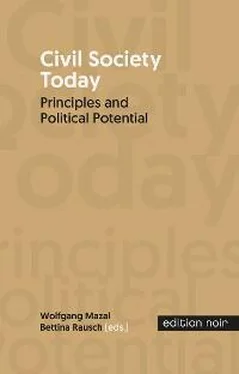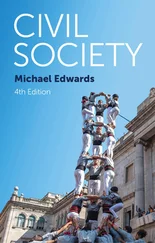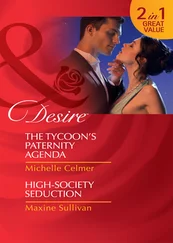Civl society
Здесь есть возможность читать онлайн «Civl society» — ознакомительный отрывок электронной книги совершенно бесплатно, а после прочтения отрывка купить полную версию. В некоторых случаях можно слушать аудио, скачать через торрент в формате fb2 и присутствует краткое содержание. Жанр: unrecognised, на английском языке. Описание произведения, (предисловие) а так же отзывы посетителей доступны на портале библиотеки ЛибКат.
- Название:Civl society
- Автор:
- Жанр:
- Год:неизвестен
- ISBN:нет данных
- Рейтинг книги:4 / 5. Голосов: 1
-
Избранное:Добавить в избранное
- Отзывы:
-
Ваша оценка:
- 80
- 1
- 2
- 3
- 4
- 5
Civl society: краткое содержание, описание и аннотация
Предлагаем к чтению аннотацию, описание, краткое содержание или предисловие (зависит от того, что написал сам автор книги «Civl society»). Если вы не нашли необходимую информацию о книге — напишите в комментариях, мы постараемся отыскать её.
dealing with the theory, history, and philosophical heritage of
the civil society, as well case studies from actual practice.
Civl society — читать онлайн ознакомительный отрывок
Ниже представлен текст книги, разбитый по страницам. Система сохранения места последней прочитанной страницы, позволяет с удобством читать онлайн бесплатно книгу «Civl society», без необходимости каждый раз заново искать на чём Вы остановились. Поставьте закладку, и сможете в любой момент перейти на страницу, на которой закончили чтение.
Интервал:
Закладка:
But now there are extremely influential alternatives to the formerly Christian character of a (civil) religion that unites individuals to form a nation. In particular, there is very special alternative in those Western states that have a large Muslim minority in their population. Members of this group often also – or even above all – feel that they are part of an Islamic culture spanning many societies and states. However, precisely this culture, which dates back to late antiquity, did not produce the Western state and the society that supports it, but, in many cases, even expressed its opposition to both. What is important in Islam is not the contraposition of the “state” and “church”, or a dualism of “politics” and “religion”. It is much more a matter of the relationship between “Dar al-Islam” and “Umma”. The latter is – completely corresponding to the Christian church as an “assembly of believers before God” – the community of Muslims. On the other hand, the Dar al-Salam – which can be translated as “house of peace”, in contrast to the “house of war (Dar al-Harb) – refers solely to that part of the world that has really already been pacified : namely, through the establishment of precisely these rules, both politically and as a form of state. A “societas perfecta” is therefore not possible in the orthodox thought of Islamic culture on the basis of any civil religion but only there where religious Muslims , who have been guided in the right direction, govern. It is therefore a matter – for the sake of peace – not only of the religious character of an individual society and its state, but of the questionable legitimacy of a special path of those societies and states that precisely do not allow themselves to be guided by Islam in which, however, Muslims live permanently.
Viewed in such contexts, the very concept of a society that is understood in a non -religious manner, as has become customary in Western cultures, seems subversive for Muslim societies and is regarded as an act of aggression by more than a few Muslims. This, in turn, is ascribed not only to the different intellectual foundations of secular-Western and religious-Islamic societies but also to the diminishing supremacy of the West that humbled and deeply damaged the “ethically superior” world of Islam. In this way, political religion becomes directly linked to political power struggles and revenge.
Acting on the foundations of civil society today, therefore, demands having arguments that are – or could, at least, become – compatible with internal debates on Islamic self-understanding. By the way, when considering China’s rise to become a dominant global power, it should be remembered that, in the future, Western ideas of a civil society will also find themselves in competition with completely different East-Asian convictions on the just relationship between the state and the people living in it. However, these combine well-established insights into traditional Chinese statecraft, which were only slipped into the once-fashionable garb of Communism, with such new possibilities of governance based on modern technology relating more to scientific data and “harmonising” social control than on trying to cultivate the willingness of a self-determined citizenry to participate. Whether a political model of this kind is inferior or superior to the Western version must be treated as an open question. The desired answer can only be provided if one’s own efforts to bring about or secure a really “good life” are reinforced through sustainable, successful politics.
In any case, civil society of the Western variety is not something that can be achieved once and for all. Anyway, it can only come about as soon as – and for as long as – its complex cultural requirements are satisfied. But, even then, it remains threatened by anti-pluralist currents regardless of their origin and goals. It can only counter the allure of ideological righteousness, and the willingness to believe in religion, with cumbersome considerations about the fact that being open to criticism is what makes learning possible, and that all historical examples of politics founded on a specific claim to truth are terrifying. A civil society can also threaten itself. This occurs especially when those civil-religious formulas and civil-liturgical practices, which guarantee the stability of the civil society through symbols appealing to feelings, are used tactically and instrumentally to defend current cultural-hegemonic positions against new competition. That is when communication-hygienic rules of political correctness develop into quasi-religious taboos, concern about the preservation of civil liberty becomes political witchcraft, and securing equal rights for all leads to a new caste structure separating the “decent” from the “evil”. In essence, these are precisely the new internal trends in our Western civil societies that, in the meantime, are impairing all the opportunities that a form of pluralism that flourished for many years granted us. For the sake of the wider common good, we should therefore attempt to better understand – and apply more honestly – those rules which, in the West, have so frequently turned selfish individuals and self-righteously competing groups into a public-spirited civil society that takes an active part in its community.
3. Indispensable rules for a civil society
How is it possible to keep a society and its state permanently capable of learning, to be able to adapt to new internal and external challenges and, in this way, realise the common good time after time? The best possible answer seems to be: As long as there is no emergency requiring immediate action, one must initiate unloaded discourse about – real or hypothetical – problems, organise open-ended debates about the causal connections of problems, and make social disputes about solutions possible. Only after all of this has taken place should decisions about what to do next be made. These, in turn, are best designed as majority decisions, because this is precisely the way to create pressure for the widest possible consideration of various opinions and interests. Of course, the majority principle established in this way also includes the protection of minorities. And this political approach has to go hand in hand with a basic attitude of always being ready to start learning anew .
The name given to a political system operating according to these kinds of rules is pluralistic democracy . Among its characteristics are a willingness to accept, and even revere, diversity – not only in matters of skin colour, but also political opinions; acknowledging the right of the individual to define his interests independently and responsibly as a matter of course – and there, especially those that one objects to oneself; and the legitimacy of dispute – even when one is at risk of losing the argument. It is also important for pluralistic democracy that the area that can be disputed, without the parties risking social ostracism, be kept as broad as possible. On the other hand, the areas that are not open to question should be kept as small as possible. It is a fact that dictatorial regimes and their subservient societies are characterised by the minimisation of what can, and the great increase in what cannot, be questioned. This ranges from the dominant role of a single party to the law of God directly influencing politics.
The name given to the “non-dispute” area of a pluralistic democracy is “minimal consensus” and it is made up of three partial consensuses. There is the consensus of values that is principally composed of the consensus that everyone has the same human rights, including that of being different from others in terms of appearance, sexual orientation, religion, and political leanings. Then there is procedural consensus . It includes non-violence and the majority principle, together with the protection of minorities. Non-violence is an especially important aspect. Intimidation through the threat of violence, the anticipation of violence, and violence itself reduce the diversity of viewpoints and interests that are freely brought into the dispute. This is precisely what reduces the opportunities for learning in and through dispute and this deprives a pluralistic democracy of its central advantage. And there is finally regulatory consensus ; for example, a consensus that demonstrations on the street are allowable, but that final decisions will be made in parliaments or by the courts. Shaping a state in a way that there can be disputes about as many topics as possible and that, as a result, the ability of politics and society to learn is optimised, is the “highly effectual secret” of pluralistic democracy and the great advantage of functioning civil society.
Читать дальшеИнтервал:
Закладка:
Похожие книги на «Civl society»
Представляем Вашему вниманию похожие книги на «Civl society» списком для выбора. Мы отобрали схожую по названию и смыслу литературу в надежде предоставить читателям больше вариантов отыскать новые, интересные, ещё непрочитанные произведения.
Обсуждение, отзывы о книге «Civl society» и просто собственные мнения читателей. Оставьте ваши комментарии, напишите, что Вы думаете о произведении, его смысле или главных героях. Укажите что конкретно понравилось, а что нет, и почему Вы так считаете.












